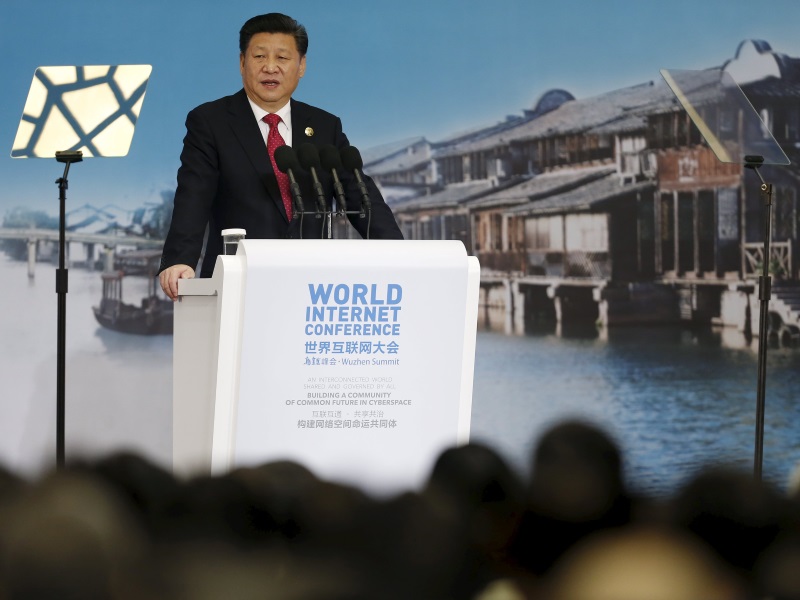- Home
- Internet
- Internet News
- China Calls for Internet Front to Fight Hacking, Cyber 'Arms Race'
China Calls for Internet Front to Fight Hacking, Cyber 'Arms Race'

"Each country should join hands and together curb the abuse of information technology, oppose network surveillance and hacking, and fight against a cyberspace arms race," Xi told China's second World Internet Conference.
"Cyberspace is similar to the real world in that both freedom and order are necessary," Xi added, saying Internet users' rights to exchange views must be respected while maintaining order in accordance with the law.
Since Xi took China's helm in early 2013, he has presided over a centralisation of domestic Internet governance and broader efforts to control, and often censor, the flow of information online, experts say.
Those efforts are aimed at maintaining stability, a lack of which the Communist Party sees as a direct threat to its rule.
China infamously operates a "Great Firewall", the world's most sophisticated online censorship system which blocks - and, as of this year, also attacks - Internet services the government deems unsavoury.
Its workers scour and scrub edgy and unwanted commentary from domestic web services.
Hacking has been a sore spot in US-China relations. On September 25, President Barack Obama said he and Xi had agreed that neither government would knowingly support cyber theft of corporate secrets to support domestic businesses.
The agreement stopped short of restricting spying to obtain government secrets, including those held by private contractors.
Good connections
Critics of China's Internet governance have said foreign tech companies should not lend Beijing credibility by agreeing to comply with its policies.
"Tech companies, including Apple, Google, Facebook, LinkedIn and Microsoft, must be prepared to say 'no' to China's repressive Internet regime and put people and principles before profits," Roseann Rife, East Asia research director at Amnesty International, said in a release on Tuesday.
Others, including press freedom group Reporters Without Borders and China censorship watchdog GreatFire.org, called for a boycott of China's World Internet Conference, which attracted executives from Chinese and US tech giants.
From the United States, the roll call of companies at the conference in the eastern city of Wuzhen included Facebook Inc, Microsoft Corp, IBM Corp, LinkedIn Corp and Netflix Inc.
China's Alibaba Group Holding Ltd, Tencent Holdings Ltd, Baidu Inc, JD.com Inc and Xiaomi Inc were also in attendance.
While Facebook and Twitter, among others, are blocked in China, that was not the case in Wuzhen where attendees enjoyed unfettered access to websites.
"This is the place with the best Internet connection in China," Kaspersky Lab chief executive Eugene Kaspersky said during a conference forum.
"The worst is in Shanghai Pudong airport," referring to the main international gateway to the country's commercial hub.
© Thomson Reuters 2015
Catch the latest from the Consumer Electronics Show on Gadgets 360, at our CES 2026 hub.
Related Stories
- Samsung Galaxy Unpacked 2025
- ChatGPT
- Redmi Note 14 Pro+
- iPhone 16
- Apple Vision Pro
- Oneplus 12
- OnePlus Nord CE 3 Lite 5G
- iPhone 13
- Xiaomi 14 Pro
- Oppo Find N3
- Tecno Spark Go (2023)
- Realme V30
- Best Phones Under 25000
- Samsung Galaxy S24 Series
- Cryptocurrency
- iQoo 12
- Samsung Galaxy S24 Ultra
- Giottus
- Samsung Galaxy Z Flip 5
- Apple 'Scary Fast'
- Housefull 5
- GoPro Hero 12 Black Review
- Invincible Season 2
- JioGlass
- HD Ready TV
- Laptop Under 50000
- Smartwatch Under 10000
- Latest Mobile Phones
- Compare Phones
- Honor Magic 8 RSR Porsche Design
- Honor Magic 8 Pro Air
- Infinix Note Edge
- Lava Blaze Duo 3
- Tecno Spark Go 3
- iQOO Z11 Turbo
- OPPO A6c
- Samsung Galaxy A07 5G
- Lenovo Yoga Slim 7x (2025)
- Lenovo Yoga Slim 7a
- Lenovo Idea Tab Plus
- Realme Pad 3
- Moto Watch
- Garmin Quatix 8 Pro
- Haier H5E Series
- Acerpure Nitro Z Series 100-inch QLED TV
- Asus ROG Ally
- Nintendo Switch Lite
- Haier 1.6 Ton 5 Star Inverter Split AC (HSU19G-MZAID5BN-INV)
- Haier 1.6 Ton 5 Star Inverter Split AC (HSU19G-MZAIM5BN-INV)






![[Sponsored] Haier C90 OLED TV | Dolby Vision IQ, 144Hz OLED and Google TV in Action](https://www.gadgets360.com/static/mobile/images/spacer.png)









